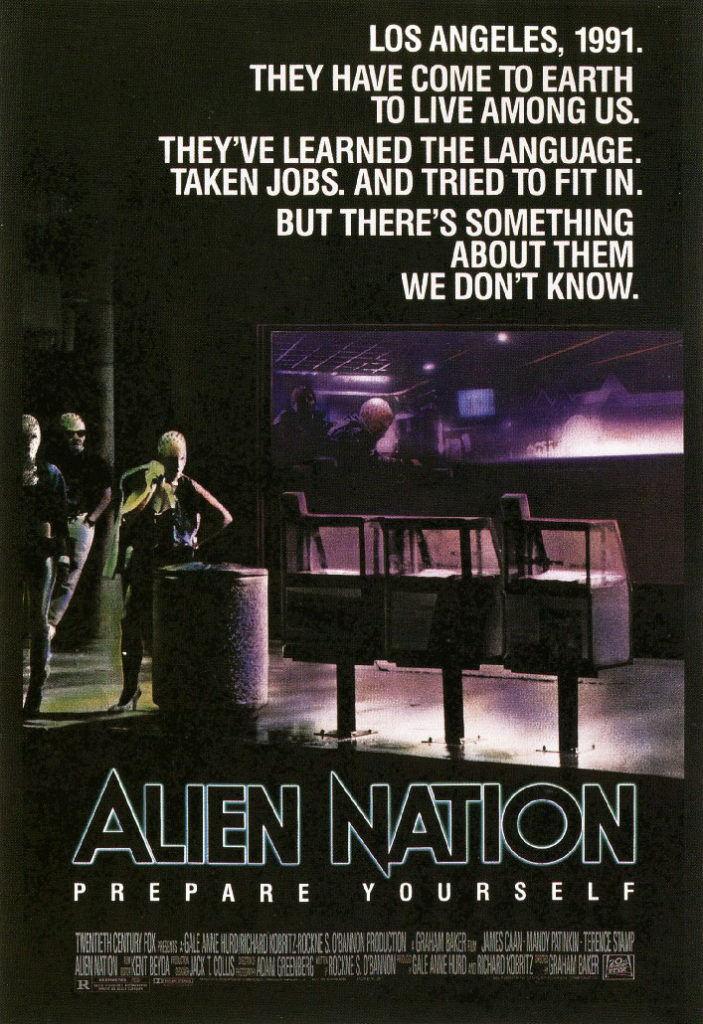There is a nasty amount of racial tension in America right now, accentuated by President-elect Trump’s impending inauguration next month. I hate that current events are affecting my perception of Alien Nation, the 1988 sci-fi film from director Graham Baker and screenwriter Rockne S. O’Bannon, but they are. Really, the filmmakers bear most of the blame, here. A huge part of the fictional universe Graham and O’Bannon crafted deals with refugees assimilating into American culture and having an effect, both positive and negative, on native demographics. Boy, I really need to find a way to flip off the politics switch in my brain when I’m watching movies.
In Alien Nation, it is the near future, the 1990s, and a race of alien refugees is making a home in southern California. They’re smarter than us, stronger and faster than us, were genetically engineered to withstand atmospheres and pressures that would kill a human, and get drunk off of soured milk.
James Caan plays Matt Sykes, a detective with the LAPD who takes on an alien partner, George (Mandy Patinkin), as a ploy to infiltrate the alien community and find his previous partner’s killer. Sykes is a stereotypical bigot cop. He has little use for the aliens, which he calls ‘slags’, often to their faces. You just know that before this film is over Sykes will learn a valuable lesson about tolerance.
The death of Sykes’ partner ends up being  tied to a budding alien drug ring, headed by an alien named Harcourt (Terrence Stamp). Harcourt is a big winner in the refugee sweepstakes, having worked his way into local politics. He’s rich and will only get richer once his drug hits the market. The drug has no effect on humans, but it’s basically space coke for the aliens. If it goes to market, it could destroy any goodwill that remains between the aliens and humans. This prospect affects George, who is heavily invested in his new life on earth, and he is willing to do much to stop Harcourt. Sykes, at first, wants nothing more than to avenge his partner.
tied to a budding alien drug ring, headed by an alien named Harcourt (Terrence Stamp). Harcourt is a big winner in the refugee sweepstakes, having worked his way into local politics. He’s rich and will only get richer once his drug hits the market. The drug has no effect on humans, but it’s basically space coke for the aliens. If it goes to market, it could destroy any goodwill that remains between the aliens and humans. This prospect affects George, who is heavily invested in his new life on earth, and he is willing to do much to stop Harcourt. Sykes, at first, wants nothing more than to avenge his partner.
The leads aren’t exactly a buddy cop duo, but they do have a good repartee between each other. Caan is a gruff individual, and channels just about all of this in his performance. Patinkin’s George, meanwhile, is just the right amount of annoying to keep his character from being repellant. He manages to embrace both naiveté and world-weariness at the same time. It’s a hell of a balancing act. George’s connections to alien culture aside, it’s his perceptions of man that give his character such depth. He marvels at our high ideals, and is heartbroken to see how often we ignore them. Like with all optimists, sometimes you just want him to shut up.
There have been stories out there about how difficult both Caan and Patinkin are to work with. I hope that the two of them really gave it to each other on set, and that’s the root of the tension they shared while on screen together. That tension just worked so well to make their partnership believable. In a movie where half the characters are aliens, that could only help the film’s overall quality.
At first blush, especially when a viewer gets their first glimpse of the makeup, Alien Nation looks like a cheap sci-fi flick. But the filmmakers treated their product with care. Swapping out a minority for an alien species can feel like a cheap way to get a readymade plot, but it also opened up avenues for exploration without being burdened by history. If it is at all possible to ignore everything one sees in the news these days, then Alien Nation is a good watch. And then they go and ruin everything by placing this song over the end credits:
Yikes. That’s some bad hat, Harry.
